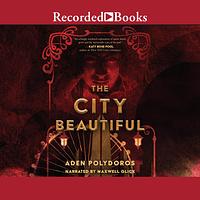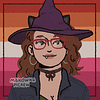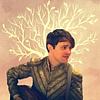Take a photo of a barcode or cover
Graphic: Violence, Fire/Fire injury
Moderate: Death, Homophobia, Blood, Antisemitism
Minor: Suicidal thoughts, Terminal illness, Murder
Graphic: Violence, Antisemitism
Moderate: Death, Rape
When Alter's roommate ends up dead during the World's Fair in 1893 Chicago, Alter knows that it wasn't the accident the police are claiming it was. A string of deaths and disappearances of young Jewish boys are cropping up over the city. To make matters worse, ever since his friend's death, Alter has been experiencing hallucinations and black outs that leave all-too-real marks on his body. He is determined to find out what really happened and put his friend's spirit to rest.
Wow, this book was mysterious and tense throughout! It took me a little ways to get into it, but once I did I was completely addicted! Alter is such a sympathetic character and I loved following his point of view as he discovered what was really going on in the City. I also....I am in love with Frankie. I'm sorry, but he is perfect. He is like.... a slightly-less-traumatized Kaz Brekker but also gay. Yup. I'm in love.
The prose in this book was beautiful and I truly loved it!
Pub Date: Oct 5
Graphic: Body horror, Child abuse, Child death, Death, Gun violence, Hate crime, Racial slurs, Racism, Violence, Blood, Antisemitism, Murder, Fire/Fire injury
Moderate: Genocide, Pedophilia, Rape, Sexual assault, Sexual violence, Death of parent
Imagine my surprise and delight when I made it through close to 500 pages of Aden Polydoros’ The City Beautiful without homophobia taking front and centre stage. This queer Jewish historical fantasy takes many dark, twisting turns on its journey through the underbelly of late 19th century Chicago—and make no mistake, difficult themes are a feature of this novel—and weaves the threads of mystery, fantasy, thriller, and historical fiction into a compelling narrative.
Protagonist Alter Rosen finds himself embroiled in a sinister plot when his best friend, Yakov, ends up murdered. Unlike the other victims in this terrible murder spree—all of them Jewish boys—Yakov’s dybbuk possesses Alter and begins to take over him completely. This sets the high stakes of The City Beautiful from the jump, and additional complications continued to draw me in and kept me reading to find out what happened next.
In addition to a solidly constructed and executed supernatural mystery, the Jewish representation and centering of Jewish history, experience, and culture added so many layers to this. In my advance reader copy, a glossary was provided at the back of the book, so even though I felt most cultural elements were clear via the context of the story, the glossary provides extra detail and clarity, either for readers who may be unfamiliar or those who would like more explanation (or both). While there are several harrowing depictions of antisemitism and antisemitic behavior throughout the novel, there is also a significant focus on Jewish faith, joy, and community as well.
As mentioned in the beginning, I love historical fiction which seamlessly transports the reader to another time period, and I felt The City Beautiful accomplished just that. Drawing from the events of the 1893 World Fair to inspire the setting, I could clearly picture the atmosphere Polydoros’ set out to construct. The romance also felt complex and nuanced, and it also had my favourite combination of tropes: friends to enemies to lovers, with a side of good boy/bad boy to boot.
Aside from pacing issues involving certain sections dragging and a wish for a few more developed side characters, I really enjoyed The City Beautiful from beginning to end. Aden Polydoros has written a rich, beautiful, dark, and compelling YA historical fiction, and I can’t wait for people to be able to experience Alter’s journey soon as well.
Thank to you Inkyard Press and NetGalley for an advance reader copy. All opinions are my own.
This book is incredible. The City Beautiful is a blend of historical fantasy and a murder mystery, told from a Jewish perspective, and queer. It is so many things, so many elements, but it works together so harmoniously.
Alter came to America with his father to escape the antisemitism of Romania, but en route his father caught typhus and died. Because Alter wasn’t able to observe proper burial rituals, on Maxwell Street he volunteers at his Shul’s Chevra Kadisha, burial society who take care of the bodies of the deceased and prepare them for burial. He’s found friends and a community, but at his core Alter’s goal is to save up enough that he can bring his mother and younger sisters to America with him.
On the Fourth of July, Alter and his friend/roommate Yakov go to see the World’s Fair in Chicago,and after separating Yakov is murdered. The police are ambivalent towards the death of a young Jewish man and have been ambivalent towards the disappearances of several other Jewish men, and because it is ruled an accident the Chevra Kadisha prepare his body. During the ritual purification in the mikveh, Alter falls in because he thinks he sees Yakov move, and ends up getting possessed by his dybbuk. Trying to figure out why he’s seeing visions, Alter reconnects with his friend Frankie who is a thief and has done more to assimilate into America.
This book is so layered and I’m just thinking of all the elements that stand out to me. The discussions of assimilation and how becoming more American equates to losing elements of Jewish identity. How antisemitism and pogroms and Jewish people being expelled from lands is such a recurring part of our shared history. The different ways Judaism is practiced and the ways Jewishness is visible. Not even getting into the actual story, I loved how deeply Jewish this was and how much Alter’s Jewishness and the mysticism and beliefs of Judaism made up so much of the fantastical elements, and the way those elements felt less fantastical and more a part of the world, the belief system. I’m trying to say, and probably doing a poor job of it, that this felt less like a fantasy (in a good way) because the fantastical elements were woven in so smoothly to the contemporary world and the experiences of the characters.
I also loved the setting of the World’s Fair, and the way Polydoros shows both how it was a fantastic experience for many people, but it was also a fantasy created to show the splendor of America, how America was superior to all the other places represented. There were several lines I marked that expressed the duality of the World’s Fair and how, despite it being a glittering white city, it also had many shadows and terrible things happened there.
This book is just phenomenal and I look forward to more from Aden Polydoros. The City Beautiful is sometimes hard to read and doesn’t shy away from showing the dark parts of Jewish history, thought that was never the focus. At its center, this is a story of survival and perseverance and family, blood and of choice. It weaves together these elements into a story that I couldn’t put down, and the ending was so satisfying on so many levels. Wholeheartedly recommend!
Graphic: Body horror, Child death, Death, Gore, Hate crime, Racial slurs, Racism, Violence, Blood, Antisemitism, Grief, Religious bigotry, Death of parent, Murder, Fire/Fire injury
Moderate: Adult/minor relationship, Child abuse, Genocide, Gun violence, Pedophilia, Rape
Minor: Physical abuse
The City Beautiful by Aden Polydoros is a queer gothic fantasy that'll have you desperate to read just one more page to get to the bottom of the mysteries that slowly unravel.
Alter Rosen is a Jewish immigrant from Romani in 1893 Chicago. Having fled his home country amid the anti-jewish sentiment spreading in Europe, Alter is trying his best to make enough to support himself and to bring his family over to the states. Keep your head down. Do honest work. Be a good mensch. He tries anyway until a boy he loves is killed, and he's determined to unwrap the mystery. He soon discovers Yakov's murder could be linked to the mysterious disappearances of other Jewish boys in his neighborhood. Then, a nightmare: Alter is possessed by Yakov's dybbuk and has to avenge him before his own soul is lost forever.
This is a historical fantasy, but something about that term just doesn't feel right to me. It's dark and twisty and feels more like a thriller to me. I love the way Polydoros weaves this story together with so many themes - Jewish lore, racism, xenophobia, working conditions of late 19th century US, queer yearning rubbing raw against the pull of religion. There's so much going on in this book, and it works so well together.
The mystery will keep you on your toes. I couldn't put this book down in some parts because I was on the edge of my seat. The imagery of the Chicago World's Fair as the backdrop to these disgusting crimes, what was supposed to be a symbol of hope and progress in the US, is the juxtaposition this book thrives on.
I loved Alter as a character, I loved Frankie as a character, I loved Raziel as a character. They're all so well done and well fleshed out, and I adored Alter's relationship with both of them. His relationship with Frankie was often fraught with guilt and anger and longing so deep, it hurt to read sometimes. So well done.
Why 4 stars instead of 5? The dialogue in a few of the scenes felt a little forced and out of place, and honestly, the book could've ended about 100 pages before it actually did. It's twisty towards the end, but I think it could've used a touch less twist.
Overall, really fantastic read, and I'll recommend it to everyone!









